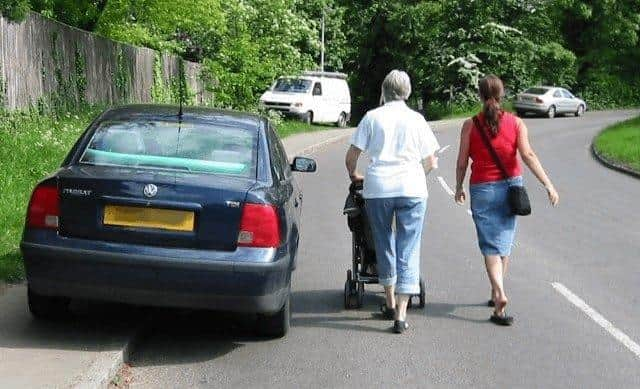Pavement parking ban won’t be enforced for another two years – Living Streets
and live on Freeview channel 276
Living Streets, which lobbies for pedestrians, said it did not expect enforcement of the measure to start until five years after it was approved by MSPs.
The body said it had spotted that the appeals process would not be established until nearly the end of 2023, so councils were not expected to start penalising drivers whose vehicles blocked pavements until the start of the following year.
Advertisement
Hide AdAdvertisement
Hide AdThe revelation comes nearly a year after Transport Secretary Michael Matheson admitted the scheme would be delayed until 2023 because of the Covid pandemic.


The measure will outlaw vehicles from pavements, beside dropped kerbs used by wheelchairs and pushchairs, and double parking.
When it became law as part of the Transport (Scotland) Act in 2019 after a decade of lobbying and failed attempts by MSPs to bring in private members’ bills, it was envisaged the ban would be implemented by 2021.
David Hunter, convenor of Living Streets’ Edinburgh group, told The Scotsman: “The consultation on the parking appeals processes says it will commence from 1 December 2023.
Advertisement
Hide AdAdvertisement
Hide Ad"In practice, I can't see councils starting enforcement until the New Year - ie 2024.
"It appears that there is going to be yet another delay in putting a stop to pavement parking.
"If the appeals process isn't in place until December next year – still 20 months away – it looks like councils won't be taking effective enforcement action until into 2024.
"There seems to be a complete lack of commitment from the Scottish Government to put in the measures to tackle pavement parking quickly.
"It's time ministers stepped in to demand more urgency."
Opposition politicians also called for faster progress.
Advertisement
Hide AdAdvertisement
Hide AdScottish Labour transport spokesperson Colin Smyth said: “It's three years since [the Scottish] Parliament passed the Transport Act and it seems it'll be another two before it's implemented.
“Even then, with the SNP and Green Government starving local authorities of cash, there is little chance they'll have the staff needed to properly enforce the pavement parking ban.
"As with everything this Government touches, there's plenty of promises but very little delivery'"
Scottish Liberal Democrat transport spokesperson Jill Reilly said: “Pavement parking is a pain for residents and a barrier for people with disabilities participating in normal life.
Advertisement
Hide AdAdvertisement
Hide Ad“Kicking this ban down the road will simply make life harder for these groups.
"The SNP need to get a move on – it seems like even administering simple schemes is beyond them.”
Scottish Conservatives transport spokesperson Graham Simpson said: “This just shows that this legislation is in the ‘too difficult’ box.
"This was well-meaning legislation that was not properly thought through.
Advertisement
Hide AdAdvertisement
Hide Ad"We pointed it out at the time and it looks as though the SNP are now seeing that."
A Transport Scotland spokesperson said: "We’re working towards the date of 1 December 2023 and we can confirm closer to the time of implementation."
A message from the Editor:
Thank you for reading this article. We're more reliant on your support than ever as the shift in consumer habits brought about by coronavirus impacts our advertisers.
If you haven't already, please consider supporting our trusted, fact-checked journalism by taking out a digital subscription.
Comment Guidelines
National World encourages reader discussion on our stories. User feedback, insights and back-and-forth exchanges add a rich layer of context to reporting. Please review our Community Guidelines before commenting.
